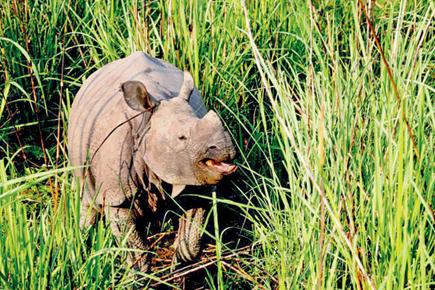Conservationist and founder of Wildlife Trust of India, Vivek Menon's latest book, Indian Mammals: A Field Guide, includes photographs, maps and illustrations to introduce the country’s 427 species of mammals

Vivek Menon, new book, Conservationist, Wildlife Trust of India, Indian Mammals: A Field Guide, greater one-horned rhinoceros, Kaziranga National Park
“Which is India’s largest mammal and our largest carnivore?” quizzes conservationist and author Vivek Menon. “You might guess elephant and tiger, and you wouldn’t be the only one to,” he says before revealing the right answers — the blue whale and the brown bear.

The greater one-horned rhinoceros, which can be found at Kaziranga National Park, Assam
What Menon is trying to illustrate is that a majority of Indians lack knowledge about the country’s native mammals. Most of what people know is largely restricted to the glamorous big cat or the seemingly affable elephant.
“But a large variety of mammals are left in the dark; no one really talks about them. Take the state of Maharashtra, for instance. Yes, tiger conservation is just as important here, but what about other threatened species, including the Kondana Rat, which can be found only in Maharashtra in the Pune-Satara region,” he rues.
ADVERTISEMENT

Vivek Menon
Creating awareness
Through his latest book, Indian Mammals: A Field Guide, Menon attempts to spread awareness about the 400-plus species that call India home. “Awareness is the first stage. Only after this comes participation and active involvement in conservation. If the book can encourage even a margin of its readers to participate, I’ll be thrilled,” he says.
The book cover features a feline beauty, but it is not the tiger. “It is a clouded leopard, which is so elusive it is almost mythical! Eight years ago, while working on my previous book, no Indian had managed to photograph it. We had rescued, hand-raised and released this one in the Manas National Park in Assam,” the conservationist says, adding that it was a conscious decision to keep the tiger off the cover.
Menon, who has founded five NGOs — the latest being Wildlife Trust of India (WTI) — began his journey as a conservationist more than two decades ago. The book, he says, is a result of his life-long affinity to animals. “While naturalists have written about birds and so on, no such book existed on India’s mammals. In fact, curiously enough, there aren’t that many studies conducted on these animals and rarely so by Indians,” the author adds.
A learning experience
“Young professionals, guides at national parks, lay person interested to know more, tourists who want to learn about the country’s mammals — the book has a large audience,” says Menon. Though it is not aimed at specialists in particular, the author claims even “super-specialists” would learn a thing or two from the book. “Those specialising in elephants could learn a thing or two about bats, or vice versa,” he laughs.
At the moment, the country has an official count of 427 mammal species. “There is always a chance that we’ll discover more. Even in the last eight years, we’ve identified five more species. This happens largely at the borders — we think a particular animal is Burmese or Chinese but no one has really conducted serious studies on them,” reveals the naturalist.
One of the most interesting finds during his research was the presence of the Pakistani sub-species of the red fox at Kargil. “I received a letter with a photograph from a researcher stating they’d spotted a red fox. When I saw it, I knew it was the Pakistani fox, not the red fox, which is found in the rest of Ladakh. Most people associate Kargil with the war, but I hope this fascinating find will change that,” says Menon optimistically.
 Subscribe today by clicking the link and stay updated with the latest news!" Click here!
Subscribe today by clicking the link and stay updated with the latest news!" Click here!







